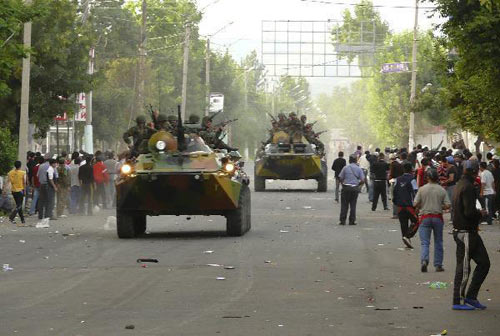Global General
Kyrgyzstan's unrest exposes heavy political jockeying
(Xinhua)
Updated: 2010-06-15 14:27
 |
Large Medium Small |
BEIJING - Widespread riots have for days rattled southern Kyrgyzstan, leaving at least 124 dead and 1,685 injured. The unrest has caused grave concern in the international community.
 |
|
Servicemen drive armoured vehicles in the city of Osh in southern Kyrgyzstan June 11, 2010. [Xinhua] |
As world countries and international organizations call for an early restoration of stability in the Central Asian state, questions remain over why violence flared up once again in two months, and how the Kyrgyz government would respond and whether Russia would send troops to interven.
Power Struggle
The latest spate of clashes broke out on Thursday night with a casino scuffle between ethnic Kyrgyz and Uzbek youngsters in the southern city of Osh, and rapidly escalated into massive riots.
Meanwhile, the bloodshed came at a sensitive juncture -- two weeks before a scheduled referendum on a new constitution. On one hand, the departure of Bakiyev left a political vacuum in Kyrgyzstan and made it all the more urgent to restore law and order.
On the other hand, the draft of the new constitution presented by the interim government was rejected by different political groups as well as a considerable part of the general public. Some critics noted that many provisions in the draft were ambiguous and even self-contradictory.
Otunbayeva on Saturday blamed Bakiyev and his supporters for the recent clashes and accused them of attempting to forestall the upcoming vote, while Bakiyev, currently in exile in Belarus, denied the charges.
Local analysts said that as the referendum marked a major step to legitimize the interim government, some political forces excluded from the government wanted to thwart the voting or even force a government reshuffle by playing up the ethnic conflicts in the south.
Alexei Makarkin, deputy director of the Moscow-based Center for Political Technology, said the flare-up came as a strong warning by various political forces in southern Kyrgyzstan that the interim government must allow others to share power.



